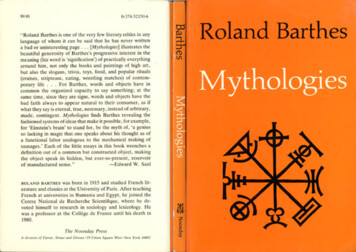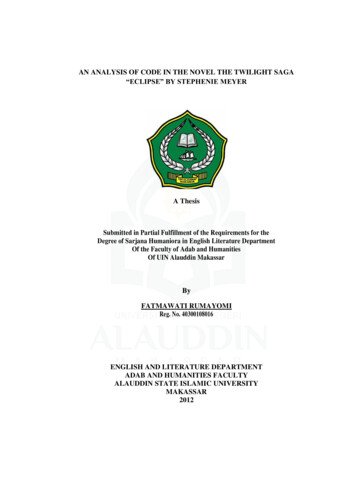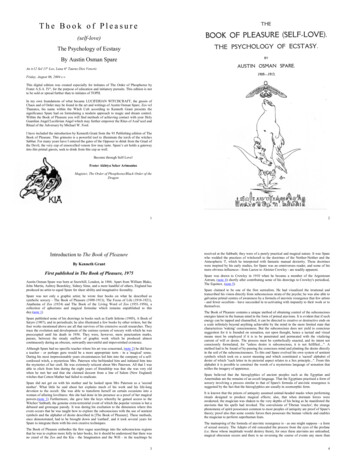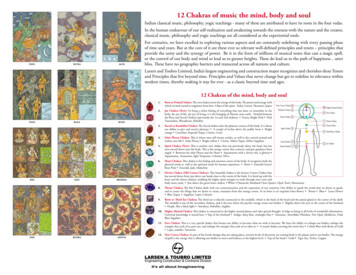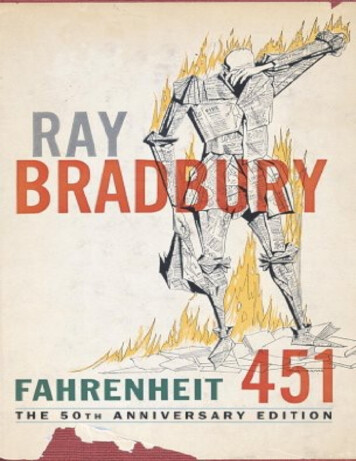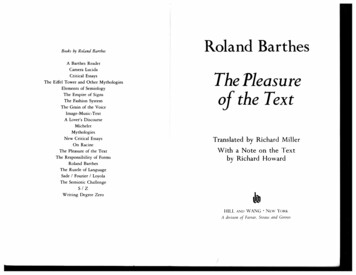
Transcription
Books by Roland BarthesA Barthes ReaderCamera LucidaCritical EssaysThe Eiffel Tower and Other MythologiesElements of SemiologyThe Empire of SignsThe Fashion SystemThe Grain of the VoiceImage-Music-TextA Lover's DiscourseMicheletMythologiesNew Critical EssaysOn RacineThe Pleasure of the TextThe Responsibility of FormsRoland BarthesThe Rustle of LanguageSade / Fourier / LoyolaThe Semiotic ChallengeS/ZWriting Degree ZeroRoland BarthesThe Pleasureof the TextTranslated by Richard MillerWith a Note on the Textby Richard HowardHILLANDWANG' NEW YORKA dirision of Farrar, Straus and Giroux
A Note on the TextTranslation and Note on the Text 1975by Farrar. Straus and Giroux, Inc.Originally published in French as Le Plaisir du texte 1973 by Editions du Seuil, ParisAll rights reservedFirst American edition, 1975Published in Canada by HarperCollinsCanadaLtdPrinted in the United States of AmericaDesigned by Karen WattTwenty-third printing, 1998Library of Congress Cataloging-in-Publication DataBanht!s, Roland.The pleasure of the text.Translation of Le plaisir du texte.I. Literature-Aesthetics. I. Title.PN45·B2813 '975801'.9375-4904The French have a distinguishing advantage whichRoland Barthes, a Frenchman through and through, hastaken, has used, has exploited in his new book about whatwe do when we enjoy a text; the French have a vocabularyof eroticism, an amorous discourse which smells neither ofthe laboratory nor of the sewer, which just-attentively,scrupulously-puts the facts. In English, we have eitherthe coarse or the clinical, and by tradition our words forour pleasures, even for the intimate parts of our bodieswhere we may take those pleasures, come awkwardlywhen they come at all. So th.lt if we wish to speak of thekind of pleasure we take-the supreme pleasure, say,associated with sexuality at its most abrupt and ruthlesspitch-we lack the terms acknowledged and allowed inpolite French utterance; we lack jouissance and jouir, asBarthes uses them here. The nomenclature of activepleasure fails us-that is the "matter" Sterne had in mindwhen he said they order this matter so much better inFrance.Roland Barthes's translator, Richard Miller, has beenresourceful, of course, and he has come up with thereadiest plausibility by translatingjouissance (for the mostpart: Barthes himself declares the choice between pleasureand the more ravaging term to be precarious, revocable,the discourse incomplete) as "bliss"; but of course hecannot come up with "coming," which precisely translatesv
r"what the original text can afford. The Bible they translatedcalls it "knowing" while the Stuarts called it "dying," theVictorians called it "spending," and we call it "coming"; ahard look at the horizon of our literary culture suggeststhat it will not be long before we come to a new word fororgasm proper-we shall call it "being."Roland Barthes, in any case, calls it jouissance, as hisown literary culture entitles him to do, and he associateshis theory of the text, in this new book, with what has beena little neglected in his own and other (French) studies ofwhat we may take, what we may have, when we read: thepleasure of the text. Pleasure is a state, of course, blissljouissance) an action, and both of them, in our culture, areheld to be unspeakable, beyond words. Here, for example,is Willa Cather, a writer Barthes has never heard of,putting in a plea of nolo contendere, which is, for all itsinsufferable air of customary infallibility, no more thansymptomatic:The qualities of a first-rate writer cannot be defined,but only experienced. It is just the thing in him whichescapes analysis that makes him first-rate. One cancatalogue all the qualities that he shares with otherwriters, but the thing that is his very own, his timbre,this cannot be defined or explained any more than thequality of a beautiful speaking voice can be.In the puritanism of our expressivity, what can be said istaken-is likely-to be no longer experienced, certainly nolonger enjoyed.VIYet Barthes has found, for all Cather's strictures, a wayto speak pleasure, a way which leads him to abandon thesystematics of earlier studies (he has found this waybefore: this new book is to SIZ as his essay on Japan,L'Empire des Signes, is to Systeme de la Mode: a writer'saphrodisiac); his way, is to e hJ.!Il elfaFaJ:' it rally, toconfess, to speak with all the entranced conviction of aman in the dock: to give himself up to an evidentlyrandom succession of fragments: facets, aphorisms,to ches and shoves, nudges, elbowings, bubbles, trialballoons, "phylacteries," he calls them, of an invisibledesign-the design is the simple staging of the question"What do we enjoy in the text?" The design is not quiteinvisible, perhaps, for it obeys the most arbitrary (andapparelft) of orders, the alphabetical, which governsBarthes's series of proses* in such a fashion that we feelheld somewhere between the high-handed and the underhanded in the aspiration to catch pleasure out, the effort tocatch up with bliss. Like filings which gather to form afigure in a magnetic field, the parts and pieces here docome together, determined to affirm the pleasure we musttake in our reading as against the indifference of (mere)knowledge, determined to instance our ecstasy, our bliss inthe text against the prudery of ideological analysis, so thatperhaps for the first time in the history of criticism we havenot only a poetics of reading-that, I think, is what* In the Church, a prose or sequence is a "rhythm" sung after theepistle, and so called because not in any regular meter.Vll
ContentsBarthes has managed so marvelously to constitute InS/Z-but a much more difficult (because supposedlyinexpressible, apparently ineffable) achievement, an eroticsof reading.RICHARD HOWARD;'VlllAffirmation / AffirmationBabel / BabelBaNI/PrattleBords / EdgesBrio / BrioClivage / SplitCommunaute / CommunityCorps / BodyCommentaire / CommentaryDerive / DriftDire / ExpressionDroite (I RightEchange / ExchangeEcoute / HearingEmotion / EmotionEnnui / BoredomEnvers / Inside outExactitude / ExactitudeFetiche / FetishGuerre / War/maginaires / Image-reservoirs/mer-texte / IntertextIsotrope / IsotropeLangue / TongueLecture / 63737
Mandarinat / MandarinateModerne / ModernNihilisme / Nihilism 4 Nomination / NominationObscurantisme / ObscurantismOedipe / OedipusPeur / FearPhrase / SentencePlaisir / PleasurePolitique / PoliticsQuotidienne / DailyRecuperation / RecuperationRepresentation / RepresentationResistances / OppositionsRive / DreamScience / ScienceSignifiance / SignificanceSujet / SubjectTheorie / TheoryValeur / ValueVoix / VoiceA tque metum tan tum concepit tunc mea materVt paretet geminos, meque metumque simul.-Hobbes.,/x
The Pleasureof the Text
E PLEASURE OF THE TEXT:like Bacon's simulator, it1 can say: never apologize, never explain. It never deniesanything: "I shall look away, that will henceforth be mysole negation."Imagine someone (a kind of Monsieur Teste in reverse)who olishes within himself all barriers, all classes, allexclusions, not by syncretism but by simple discard of thatold specter: logical contradiction; who mixes every language, even those said to be incompatible; who silentlyaccepts every charge of illogicality, of incongruity; whoremains passive in the face of Socratic irony (leading thein terlocutor to the supreme disgrace: self-contradiction)and legal terrorism (how much penal evidence is based ona psychology of consistency!). Such a man would be themockery of our society: court, school, asylum, politeconversation would cast him out: who endures contradiction without shame? Now this anti-hero exists: he is thereader of the text at the moment he takes his pleasure.Thus the Biblical myth is reversed, the confusion of3
tong es is no longer a punishment, the subject gains accesst blIss by the cohabitation of languages working side byside: the text of pleasure is a sanctioned Babel.(Pleasure/Bliss: terminologically, there is always a vacillatio -I s,tumb e I err. In any case, there will always be amargm of mdeclSlon; the distinction will not be the sourceof absolute classifications, the paradigm will falter themeaning will be precarious, revocable, reversible: thediscourse incomplete.)If I read this sentence, this story, or this word withpleasure, it is because they were written in pleasure (suchpleasure does not contradict the writer's complaints), Butthe opposite? Does writing in pleasure guarantee-guarantee me, the writer-my reader's pleasure? Not at all. Imust seek out this reader (must "cruise" him) withoutknowing where he is, A site of bliss is then created. It is notthe reader's "person" that is necessary to me, it is this site: he possi,bility of a dialectics of desire, of an unpredictabilIty of blIss: the bets are not placed, there can still be agame.language which forms by the effect of a si ple need ,ofwriting. Here we are not dealing with perverslOn but WIthdemand. The writer of this text employs an unweanedlanguage: imperative, automatic, unaffectionate, a minordisaster of static (those milky phonemes which the remarkable Jesuit, van Ginnekin, posited between writing andlanguage): these are the motions of ungratified s cking" ofan undifferentiated orality, intersecting the orahty whIchproduces the pleasures of gastrosophy and of language.You address yourself to me so that I may read you, but Iam nothing to you except this address; in your eyes, I amthe substitute for nothing, for no figure (hardly that of themother); for you I am neither a body nor even an object(and I couldn't care less: I am not the one whose souldemands recognition), but merely a field, a vessel forexpansion. It can be said that after all, you ha e writte this text quite apart from bliss; and thIS prattlm? text I,Sthen a frigid text, as any demand is frigid until deSIre, untIlneurosis forms in it.I am offered a text. This text bores me. It might be saidto prattle. The prattle of the text is merely that foam ofNeurosis is a makeshift: not with regard to "health" butwith regard to the "impossible" Bataille speaks o ("Ne rosis is the fearful apprehension of an ultimate ImpossIble," etc.); but this makeshift is the only one that allowsfor writing (and reading). So we arrive at this para ox: thetexts, like those by.A !: or by others-whIch arewritten again;t urosis, from the center of madnes.:"contain within themselves, if they want to be :ad, that bIt45
of neurosis necessary to the seduction of their readers:these terrible texts are all the same flirtatious texts.Thus every writer's motto reads: mad I cannot be, sane Ido not deign to be, neurotic I am.- The !'.!j'Q1LllCrite. 19" me that de§irfNLl11f.:.-.This proof exists: it is writing. Writing is: the science ofth rrous"b1isses of language, its Kama Sutra (thisscience has but one treatise: writing itself).Sade: the pleasure of reading him clearly proceeds fromcertain breaks (or certain collisions): antipathetic codes(the noble and the trivial, for example) come into contact;pompous and ridiculous neologisms are created; pornographic messages are embodied in sentences so pure theymight be used as grammatical models. As textual theoryhas it: the language is redistributed. Now, such redistribution is always achieved by cutting. Two edges are created:an obedient, conformist, plagiarizing edge (the language isto be copied in its canonical state, as it has beenestablished by schooling, good usage, literature, culture),and another edge, mobile, blank (ready to assume anycontours), which is never anything but the site of its effect:the place where the death of language is glimpsed. These6two edges, the compromise they bring about, are necessary.Neither culture nor its destruction is erotic; it is the seambetween them, the fault, the flaw, which becomes so. Thepleasure of the t.ext is like th t untenable, !mp.ossi le,purely novelistic mstant so rehshed by Sade s hbertmewhen he manages to be hanged and then to cut the rope atthe very moment of his orgasm, his bliss.Whence, perhaps, a means of evaluating th: wQr.k§ ofour modernity: their value would proceed from theirduplicity. By which it must be understood that they. a.lwayshave two edges. The subversive edge may seem pnvIlegedbecause it is the edge of violence; but it is not violencewhich affects pleasure, nor is it destruction which interestsit; what pleasure wants is the site of a loss, the seam, thecut, the deflation, the dissolve which seizes the subject inthe midst of bliss. Culture thus recurs as an edge: in nomatter what form.Especially, of course (here is where the edge will beclearest), in the form of a pure materiality: the language,its lexicon, its metrics, its prosody. In Philippe Sollers'sLois, everything is attacked, dismantled: ideological structures, intellectual solidarities, the propriety of idioms, andeven the sacred armature of syntax (subject/predicate):the text no longer has the sentence for its model; often it isa powerful gush of words, a ribbon of infra-language. Yet7
In Severo Sarduy's Cobra, the alternation is that of twopleasures in a state of competition; the other edge is theother delight: more, more, still more! one more word, onemore celebration. Language reconstructs itself elsewhereunder the teeming flux of every kind of linguistic pleasure.Where is this elsewhere? In the paradise of words. Cobra isin fact a paradisiac text, utopian (without site), a heterology by plenitude: all the signifiers are here and each scoresa bull's-eye; the author (the reader) seems to say to them:I love you all (words, phrases, sentences, adjectives,discontinuities: pell-mell: signs and mirages of objectswhich they represent); a kind of Franciscanism invites allwords to perch, to flock, to fly off again: a marbled,iridescent text; we are gorged with language, like childrenwho are never refused anything or scolded for anything or,even worse, "permitted" anything. Cobra is the pledge ofcontinuous jubilation, the moment when by its very excessverbal pleasure chokes and reels into bliss.Of course, rhetoric recognizes discontinuities in construction (anacoluthons) and in subordination (asyndetons); but with Flaubert, for the first time, discontinuity isno longer exceptional, sporadic, brilliant, set in the basematter of common utterance: there is no longer a languageon the other side of these figures (which means, in anothersense: there is no longer anything but language); ageneralized asyndeton seizes the entire utterance, so thatthis very readable discourse is underhandedly one of thecraziest imaginable: all the logical small change is in thein terstices.This is a very subtle and nearly untenable status fordiscourse: narrativity is dismantled yet the story is stillreadable: never have the two edges of the seam beenclearer and more tenuous, never has pleasure been betteroffered to the reader-if at least he appreciates controlleddiscontinuities, faked conformities, and indirect destructions. In addition to the success which can here beattributed to an author, there is also, here, a pleasure ofperformance: the feat is to sustain the mimesis of language(language imitating itself), the source of immense pleasures, in a fashion so radically ambiguous (ambiguous tothe root) that the text never succumbs to the goodconscience (and bad faith) of parody (of castrating laughter, of "the comical that makes us laugh").Flaubert: a way of cutting, of perforating discoursewithout rendering it meaningless.Is not the most erotic portion of a body where thegarment gapes?Tn pervErSiOll(whicllTsinerealrrl'oftextualit all collides with another edge: that of (decasyllabic)meter, of assonance, of plausible neologisms, of prosodicrhythms, of (quoted) truisms. The dismantling of languageis intersected by political assertion, is edged by the age-oldculture of the signifier. -------,--- 89
pleasure) there are no "erogenous zones" (a foolishexpression, besides); it is intermittence, as psychoanalysishas so rightly stated, which is erotic: the intermittence ofskin flashing between two articles of clothing (trousers andsweater), between two edges (the open-necked shirt, theglove and the sleeve); it is this flash itselfwhi h seduces orrather: the staging of an appearanc ; :'dis PI;earance.' J ! . r . ,QL,1he.,.1 KLi&-,,,nQt,Jh .,,,pl u.re ?(,.! c.orp,Q[ :.lL,striptease.-OJ:.-4 'nafJative suspense. In thesecases, there is no tear, no edges: a gradual unveiling: theentire excitation takes refuge in the hope of seeing thesexual organ (schoolboy's dream) or in knowing the end ofthe story (novelistic satisfaction). Paradoxically (since it ismass-consumed), this is a far more intellectual pleasurethan the other: an Oedipal pleasure (to denude, to know,to learn the origin and the end), if it is true that every.narrative (every unveiling of the truth) is a staging of the(absent, hidden, or hypostatized) father-which wouldexplain the solidarity of narrative forms, of family structures, and of prohibitions of nudity, all collected in ourculture in the myth of Noah's sons covering his nakedness.unconcerned with the integrity of the text; our very avidityfor knowledge impels us to skim or to skip certain passages(anticipated as "boring") in order to get more quickly tothe warmer parts of the anecdote (which are always itsarticulations: whatever furthers the solution of the riddle,the revelation of fate): we boldly skip (no one is watching)descriptions, explanations, analyses, conversations; doingso, we resemble a spectator in a nightclub who climbs ontothe stage and speeds up the dancer's striptease, tearing offher clothing, but in the same order, that is: on the one handrespecting and on the other hastening the episodes of theritual (like a priest gulping down his Mass). Tmesis, sourc ,or figu of p] . e, here confronts two prosaic edges withone another; it sets what is useful to a knowledge of thesecret against what is useless to such knowledge; tmesis isa seam or flaw resulting from a simple principle offunctionality; it does not occur at the level of the structureof languages but only at the moment of their consumption; the.,auJgor cannot predict tmesis: hecan,ng.t choos to write what ;i7rnotEe-read.-Andit is the very rhythmor hat is read and what is not read that creates thepleasure of the great narratives: has anyone ever readProust, Balzac, War and Peace, word for word? (Proust'sgood fortune: from one reading to the next, we never skipthe same passages.)yet:Yet the most classical narrative (a novel by Zola orBalzac or Dickens or Tolstoy) bears within it a sort ofdiluted tmesis: we do not read everything with the sameintensity of reading; a rhythm is established, casual,Thus, W ,LL y,in .a. narrative is not directly itscontent or even its structure, but rather the abrasions IIOI I
i uPo lhs:Jill J1.Jface;"JI a(L() ?I kip, I Jookup.J, Jj!L" n again. Which has nothing to do with the deeplacer ti()n the text of bliss inflicts upon language itself, andnot upon the simple temporality of its reading.Whence two systems of reading: one goes straight to thearticulations of the anecdote, it considers the extent of thetext, ignores the play of language (if I read Jules Verne, Igo fast: I lose discourse, and yet my reading is nothampered by any verbal loss-in the speleological sense ofthat word); the other reading skips nothing; it weighs, itsticks to the text, it reads, so to speak, with application andtransport, grasps at every point in the text the asyndetonwhich cuts the various languages-and not the anecdote:it is not (logical) extension that captivates it, the winnowing out of truths, but the layering of significance; as in thechildren's game of topping hands, the excitement comesnot from a processive haste but from a kind of vertical din(the verticality of language and of its destruction); it is atthe moment when each (different) hand skips over the next(and not one after the other) that the hole, the gap, iscreated and carries off the subject of the game-thesubject of the text. Now paradoxically (so strong is thebelief that one need merely go fast in order not to bebored), this second, applied reading (in the real sens of theword "application") is the one suited to the modern text,the limit-text. Read slowly, read all of a novel by Zola, andthe book will drop from your hands; read fast, in snatches,some modern text, and it becomes opaque, inaccessible toyour pleasure: you want something to happen and nothing12does, for what happens to the language does not happen tothe discourse: what "happens," what "goes away," theseam of the two edges, the interstice of bliss, occurs inthe volume of the languages, in the uttering, not in thesequence of utterances: not to devour, to gobble, but tograze, to browse scrupulously, to rediscover-in order toread today's writers-the leisure of bygone readings: to bearistocratic readers.If I agree to judge a text according to pleasure, I cannotgo on to say: this one is good, that bad. No awards, no"critique," for this always implies a tactical aim, a socialusage, and frequently an extenuating image-reservoir. Icannot apportion, imagine that the text is perfectible,ready to enter into a play of normative predicates: it is toomuch this, not enough that; the text (the same is true of thesinging voice) can wring from me only this judgment, inno way adjectival: that's it! And further still: that's it forme! This "for me" is neither subjective nor existential, butNietzschean (" . basically, it is always the same question: What is itfor me? . . . ").The brio of the text (without which, after all, there is notext) is its will to bliss: just where it exceeds demand,transcends prattle, and whereby it attempts to overflow, tobreak through the constraint of adjectives-which are13
those doors of language through which the ideological andthe imaginary come flowing in./ / / 4-p-le-,!:. .ill Jhe text that contents, fills, grants./ euphona; the text that comes from culture and does not( ) .break with it, is linked to a comfortable practice of rea. ding. i&S, the text that imposes a state of loss, the textthat discomforts (perhaps to the point of a certainboredom), unsettles the reader's historical, cultural, psychological assumptions, the consistency of his tastes,( values, memories, brings to a crisis his relation with"",.language.Now the subject who keeps the two texts in his field andin his hands the reins of pleasure and bliss is ananachronic subject, for he simultaneously and contradictorily participates in the profound hedonism of all culture.(which permeates nnu-qiileny-uIider cover of an art devivre shared by the old books) and in the destruction ofthat culture: he enjoys the consiste ci(;fhi .s ItilO()d'(thatis his pleasure) and3 . . )t ! ?s (that is his bliss). He is asu.Qj gt. pliUwi . . Qy.eJ,.dQUblypeiveise.-' --fools of all kinds, who decree foreclosure of the text and ofits pleasure, either by cultural conformism or by intransigent rationalism (suspecting a "mystique" of literature) orby political moralism or by criticism of the signifier or bystupid pragmatism or by snide vacuity or by destruction ofthe discourse, loss of verbal desire. Such a society wouldhave no site, could function only in total atopia; yet itwould be a kind of phalanstery, for in it contradictionswould be acknowledged (and the risks of ideologicalimposture thereby restricted), difference would be observed, and conflict rendered insignificant (being unproductive of pleasure).Society of the Friends of the Text: its members wouldhave nothing in common (for there is no necessaryagreement on the texts of pleasure) but their enemies:"Let difference surreptitiously replace conflict." Difference is not what makes or sweetens conflict: it isachieved over and above conflict, it is beyond and alongsideconflict. ConfliGLis nothing butthe.moral state of difference; whenever (and this is becoming frequent) conflictis not tactical (aimed at transforming a real situation), onecan distinguish in it the failure-to-attain-bliss, the debacleof a perversion crushed by its own code and no longer ableto invent itself: conflict is always.coged, aggression ismerely the most worn-out oflanguages. Forgoing violence,I forgo the code itself (in Sade's texts, outside all codesbecause they continually invent their own, appropriateonly to themselves, there are no conflicts: only triumphs).I love the text because for me it is that rare locus oflanguage from which any "scene" (in the household,1415---------.
rconjugal sense of the term), any logomachy is absent. Thetext is never a "dialogue": no risk of feint, of aggression, ofblackmail, no rivalry of ideolects; the text establishes asort of islet within the human-the common-relation,manifests the asocial nature of pleasure (only leisure issocial), grants a glimpse of the scandalous truth aboutbliss: that it may well be, once the image-reservoir ofspeech is abolished, neuter.On the stage of the text, no footlights: there is not,behind the text, someone active (the writer) and out frontsomeone passive (the reader); there is not a subject and anobject. The text supersedes grammatical attitudes: it is theundifferentiated eye which an excessive author (AngelusSilesius) describes: "The eye by which I see God is thesame eye by which He sees me."Apparently Arab scholars, when speaking of the text,use this admirable expression: the certain body. Whatbody? We have several of them; the body of anatomistsand physiologists, the one science sees or discusses: this isthe text of grammarians, critics, commentators, philologists (the pheno-text). But we also have a body of blissconsisting solely of erotic relations, utterly distinct fromthe first body: it is another contour, another nomination;thus with the text: it is no more than the open list of the16Ifires of language (those living fires, intermittent lights,wandering features strewn in the text like seeds and whichfor us advantageously replace the "semina aeternitatis, " the"zopyra," the common notions, the fundamental assumptions of ancient philosophy). Does the text have humanform, is it a figure, an anagram of the body? Yes, but ofour erotic body. The pleasure of the text is irreducible tophysiological need.The pleasure of the text is that moment when my bodypursues its own ideas-for my body does not have thesame ideas I do.How can we take pleasure in a reported pleasure(boredom of all narratives of dreams, of parties)? How canwe read criticism? Only one way: since I am here asecond-degree reader, I must shift my position: instead ofagreeing to be the confidant of this critical pleasure-asure way to miss it-I can make myself its voyeur: Iobserve clandestinely the pleasure of others, I enterperversion; the commentary then becomes in my eyes atext, a fiction, a fissured envelope. The writer's perversity(his pleasure in writing is without junction), the doubled,the trebled, the infinite perversity of the critic and of hisreader.
A text on pleasure cannot be anything but short (as wesay: is that all? It's a bit short); since pleasure can only bespoken through the indirection of a demand (I have a rightto pleasure), we cannot get beyond an abridged, two-tensedialectics: the tense of doxa, opinion, and the tense ofparadoxa, dispute. A third term is missing, besides pleasureand its censure. This term is postponed to later, and solong as we cling to the very name of "pleasure," every texton pleasure will be nothing but dilatory; it will be anintroduction to what will never be written. Like thoseproductions of contemporary art which exhaust theirnecessity as soon as they have been seen (since to see themis immediately to understand to what destructive purposethey are exhibited: they no longer contain any contemplative or delectative duration), such an introduction canonly repeat itself-without ever introducing anything.occurs whenever social language, the sociolect,fails me (aswe say: my courage fails me). Thus another name fordrifting would be: the Intractable--or perhaps even:Stupidity.However, if one were to manage it, the very utterance ofdrifting today would be a suicidal discourse. c: tl flJ)L!.bL(gxl. .te.xtofpleasure:The pleasure of the text is not necessarily of a triumphant, heroic, muscular type. No need to throw out one'schest. My pleasure can very well take the form of a drift.Drifting occurs whenever I do not respect the whole, andwhenever, by dint of seeming driven about by language'sillusions, seductions, and intimidations, like a cork on thewaves, I remain motionless, pivoting on the intractablebliss that binds me to the text (to the world). Driftingthese expressionsare ambiguous because French has no word that simultaneously covers pleasure (contentment) and bliss (rapture).Therefore, "pleasure" here (and without our being able toanticipate) sometimes extends to bliss, sometimes is opposed to it. But I must accommodate myself to thisambiguity; for on the one hand I need a general "pleasure" whenever I must refer to an excess of the text, to whatin it exceeds any (social) function and any (structural)functioning; and on the other hand I need a particular"pleasure," a simple part of Pleasure as a whole, wheneverI need to distinguish euphoria, fulfillment, comfort (thefeeling of repletion when culture penetrates freely), fromshock, disturbance, even loss, which are proper to ecstasy,to bliss. I cannot avoid this ambiguity because I cannotcleanse the word "pleasure" of meanings I occasionally donot want: I cannot avoid the fact that in French "pleasure" refers both to a generality ("pleasure principle") and to1819
ra miniaturization ("Fools are put on earth for our minorpleasures"). Thus I must allow the utterance of my text toproceed in contradiction.Is pleasure only a minor bliss? Is bliss nothing butextreme pleasure? Is pleasure only a weakened, conformistbliss-a bliss deflected throug
The pleasure of the text. Translation of Le plaisir du texte. I. Literature-Aesthetics. I. Title. PN45·B2813 '975 801'.93 75-4904 A Note on the Text The French have a distinguishing advantage which Roland Barthes, a Frenchman through and through, has taken, has used,
